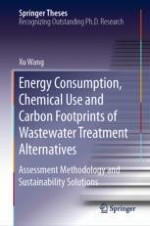2020 | OriginalPaper | Chapter
6. Scenario Analysis for the Multi-objective Management of Municipal Wastewater
Author : Xu Wang
Published in: Energy Consumption, Chemical Use and Carbon Footprints of Wastewater Treatment Alternatives
Publisher: Springer Singapore
Activate our intelligent search to find suitable subject content or patents.
Select sections of text to find matching patents with Artificial Intelligence. powered by
Select sections of text to find additional relevant content using AI-assisted search. powered by
